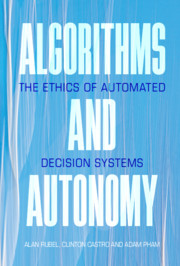Algorithms and Autonomy. The Ethics of Automated Decision Systems
This is a reference book on the key topics of ethics of artificial intelligence. Selected statements from the last chapter of this open access book:
We have argued that three broad facets of autonomy are affected by algorithmic systems. First, algorithmic systems are relevant to what we owe each other as autonomous agents. That is the focus of Chapters 3 and 4. In Chapter 3 we addressed the material conditions that we owe others and argued that respecting people as autonomous demands that any algorithmic system they are subjected to must be one that they can reasonably endorse. It does not require that they value particular outcomes or that they not bemade worse off by such systems. Rather, systemsmust either comport with agents’ own ends or be consistent with fair terms of social cooperation.We argued that persons being able to reasonably endorse a system turns on the system’s reliability, responsibility, stakes, and relative burden. Chapter 4 turned to the issues of what information we owe others. There we argued that people are owed information as a function of their practical agency (i.e., their ability to act and carry out plans in accord with their values) and as a function of their cognitive agency (i.e., their ability to exercise evaluative control over mental states, including beliefs, desires, and reactive responses). We offered several principles for information access grounded in agency. The second connection between algorithmic systems and autonomy is ensuring the conditions under which people are autonomous.
In Chapter 5 we considered the relationship between algorithmic systems and freedom.We explained that algorithms bear upon negative, positive, and republican freedomand offered a general account of freedom as ecological non-domination. Key to understanding that ecology is recognizing three key challenges to freedom: affective challenges, deliberative challenges, and social challenges. In Chapter 6 we offered some suggestions for addressing some facets of those challenges. Specifically, we argue that a kind of epistemic paternalismis both permissible and (under some conditions) obligatory. Chapters 7 and 8 shift focus to the responsibilities of agents in light of the fact that they are autonomous. In Chapter 7 we argue that algorithmic systems allow agents deploying such systems to undermine a key component of responsibility, viz., providing an account for actions for which they are responsible. Specifically, we argue that complex systems create an opportunity for “agency laundering,” which involves a failure to meet one’s moral responsibility for an outcome by attributing causal responsibility to another person, group, process, or technology. Chapter 8 addresses a different facet of responsibility. Citizens within democratic states have a responsibility to exercise their autonomy in order to legitimate political authority. That is, they have a responsibility to help ensure that governments, laws, policies, and practices are justifiable. However, some kinds of algorithmic systems hinder citizens’ abilities to do that. They can do so by undermining the epistemic conditions necessary to underwrite the “normative authority” path to legitimacy or by undermining the exercise of autonomy necessary to underwrite the “democratic will” path to legitimacy.
